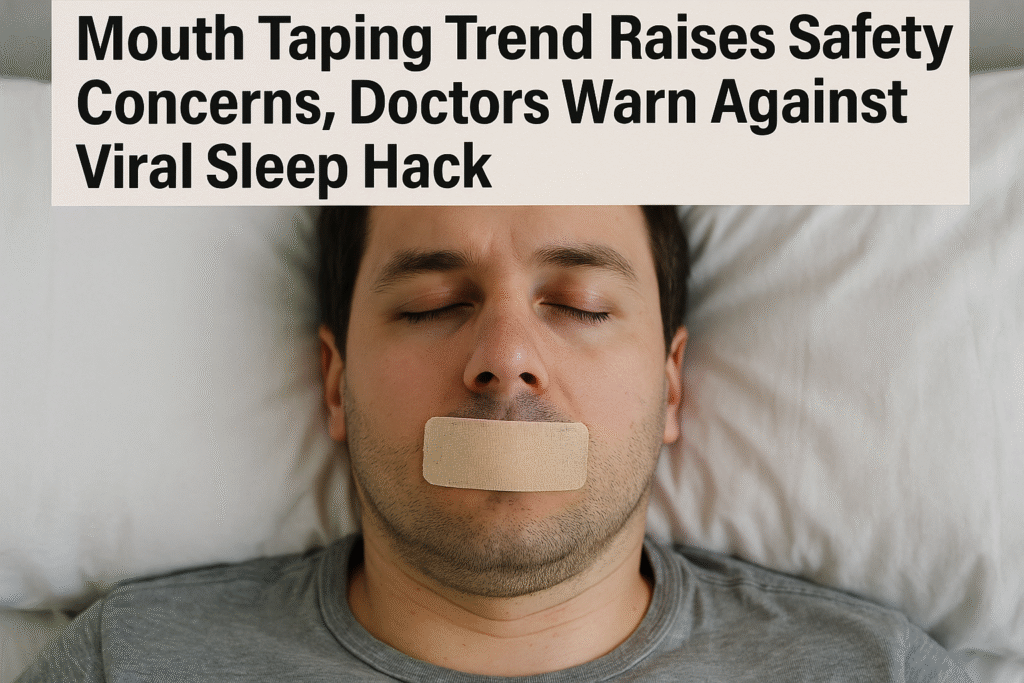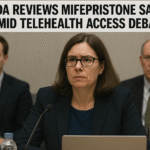By Harshit | September 28, 2025 | Washington, D.C. | 2:30 AM EDT
A Viral Trend With Dangerous Implications
Having your mouth taped shut might sound like the stuff of nightmares, but a growing number of people are doing just that in pursuit of better sleep. The practice, widely known as “mouth taping,” has gained popularity on TikTok and other social media platforms, where influencers and wellness promoters claim it reduces snoring, improves sleep quality, and encourages nasal breathing.
Doctors, however, are sounding the alarm. Experts in sleep medicine say the trend is not supported by science and carries real risks, including the possibility of worsening sleep disorders like obstructive sleep apnea or even leading to suffocation.
“The studies behind mouth tape are small, the benefits are modest, and the potential risks are there,” said Dr. Kimberly Hutchison, a neurologist and sleep medicine expert at Oregon Health & Science University.
Why Nasal Breathing Matters
While physicians agree that nose breathing is generally healthier than mouth breathing, taping the mouth shut is not the right solution. The nose serves as a natural filtration system, trapping dust, allergens, and other particles before they reach the lungs. Breathing through the nose also helps regulate airflow and maintain proper humidity levels in the respiratory tract.
Mouth breathing, on the other hand, can cause dry mouth, throat irritation, bad breath, and oral health issues. It is also linked to an increase in snoring. But experts caution that forcing nasal breathing with tape introduces unnecessary risks rather than solving the root cause.
The Science Behind the Claims
Supporters of mouth taping often cite small studies suggesting it might reduce snoring or mild sleep-disordered breathing. However, these studies are limited in size, lack rigorous methodology, and do not offer strong evidence. Most showed little to no improvement in sleep quality.
“There’s no strong evidence that mouth taping helps improve sleep in a meaningful way,” said Dr. David Schulman, a sleep doctor at Emory University. “But there are potential dangers to be avoided.”
Safer Alternatives to Improve Sleep
Instead of turning to tape, experts recommend evidence-based approaches to address sleep problems. Prescription oral appliances can help open airways, while CPAP (continuous positive airway pressure) machines remain the gold standard for treating sleep apnea.
Lifestyle changes are also effective. Quitting smoking, losing weight, and addressing nasal congestion can significantly improve nighttime breathing.
“The safest approach is to figure out why you’re breathing through your mouth in the first place,” Schulman said. “Mouth breathing could be a sign of something serious, like obstructive sleep apnea, that requires proper diagnosis and treatment.”
The Role of Sleep Apnea
Obstructive sleep apnea is a common but underdiagnosed condition in which breathing repeatedly stops and starts during sleep due to airway obstruction. It is closely linked to mouth breathing and snoring.
“The reason sleep apnea can be harmful is that it decreases the quality of sleep, which can affect you day to day or even over the course of your life,” explained Dr. Brian Chen, a sleep specialist at the Cleveland Clinic. “Depending on severity, patients may feel chronically tired or may need longer periods of rest to recover.”
Experts recommend undergoing a sleep test, many of which can now be conducted at home, to determine whether a sleep disorder is present.
“It’s always better to know than not know,” Schulman added. “If you know something is going on and choose not to pursue treatment, at least you’re making an informed decision.”
Expert Consensus: Don’t Tape Your Mouth
Medical professionals are united in their warning: mouth taping is not a safe or effective solution for sleep problems. While nasal breathing has health benefits, forcing it through risky methods can do more harm than good.
“If you’re struggling with snoring or poor sleep, talk to a sleep specialist instead of following unproven trends online,” Hutchison said. “There are safer and more effective ways to address the problem.”







